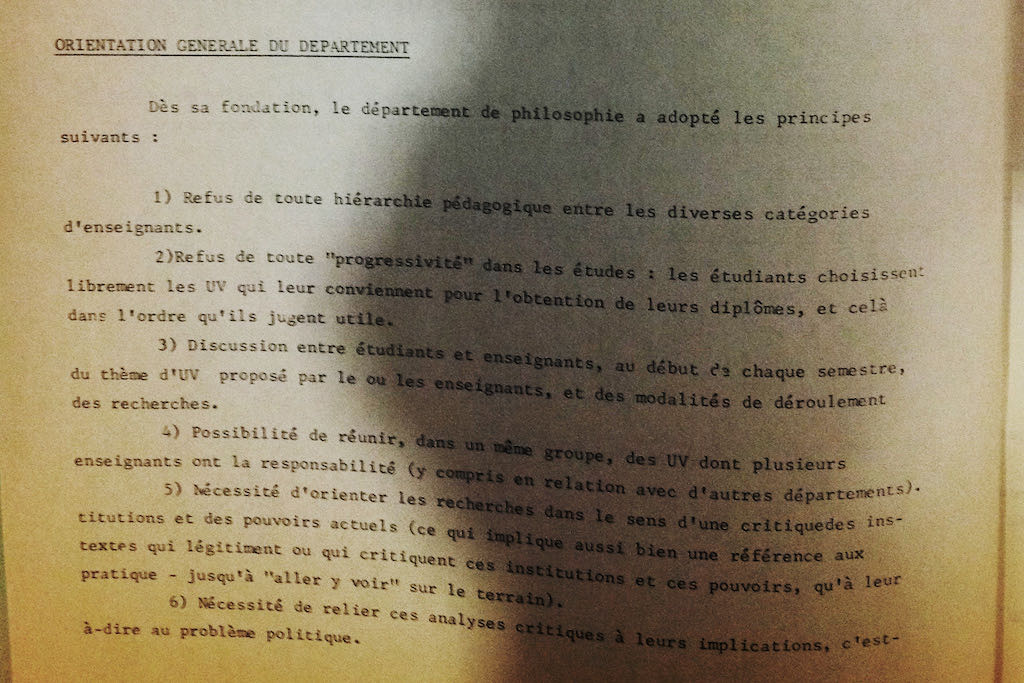At Paris 8’s inception, class analysis and Marxism-Leninism remained central categories of disciplinary critique. “As the class struggle broke out openly inside the university [in May 1968], the status of the ‘theoretical’ was thrown into doubt, though not by the perennial blabber about praxis and the concrete, but by the reality of a mass ideological revolt” (Rancière 2011:129). After debates in Autumn 1968 about the Department’s project, Alain Badiou drafted a mission statement for the Department. He was then a young Maoist; thirty years later he would become a successful French Theorist on the Anglophone theory book market. In his mission statement, he pictured philosophy as “a particular form of intervention in class struggle, on the specific field of ideological struggle,” and he argued that “the absolutely progressive line is represented by Marxist-Leninist forms of intervention on the philosophical front.” Disavowing “scholastic classes on Marxism,” he argued instead for an immediately political philosophy. “We [on] will aim to bring concepts to life by effectively incorporating them into political analysis and practice” (Badiou in Dormoy-Rajramanan 2004:53–4).
Badiou’s text never became a political consensus in its milieu. Not even close. But it still served as a model for a collective form of utopian investment. In this, it borrowed from the conventions of Marxist culture, with its characteristic forms of socialized optimism. Consider such typical symbols as the Communist Manifesto, the “Internationale,” or the Little Red Book: these can become externalized forms of utopian hope that one can return to as the need arises. Badiou’s text conjured up an impersonal utopianism, centered outside of individual consciousness. When he argued that “the task of philosophy teaching is thus to help implant in the student masses the theoretical preponderance of Marxism-Leninism,” the image is of political commitment “implanted” from the outside.
In any event, Badiou’s text was in no way expected to create subjective interiority. No one denied that everyone at Vincennes had their own subjective and political commitments, and no one tried to shift them by persuasion or even fiat. Yet texts like Badiou’s sought to organize a rudimentary horizon of collective investment that lay beyond subjectivity. They conjured up a consensus radicalism that could transcend political differences, at least in moments of protest effervescence. The Department’s General Assembly declared in 1970 that “Revolutionary political action has always had its place in the department… To protect the presence of revolutionary militants among us, the department has always shown complete solidarity and unity, across any political divergences.”[20]
The first years of the Department nevertheless saw bitter internal conflicts, often advanced in polemical pamphlets. The orthodox Communists were hostile to the far left, insisting that philosophy students were “destined to enter the labor market,” largely as teachers. They insisted — and their insistence still resonated decades later — that the Department was not serving underprivileged students through its anarchic refusal of student assessment and traditional curricula.[21] The far left, meanwhile, denounced their professors for retreating into teaching theory and abandoning revolutionary practice.[22] Philosophy teachers were not necessarily unsympathetic to this view. A group of them wrote that “PHILOSOPHY ITSELF IS WALLED UP IN THE UNIVERSITY, LET’S BREAK DOWN THE WALL.”[23] The classroom itself was an anarchic space in these days, liable to be interrupted by strikes or activist interventions. An anonymous comedian lampooned the Department’s functioning, depicting it as a theatre of ants trapped in hackneyed “radical” debates inside a fishbowl.[24]

Over the course of the 1970s, collective representations in the Philosophy Department became less overly revolutionary, less oriented towards class struggle, and less Marxist.[26] By the late 1970s, François Châtelet would write that the Department was oriented around a generically radical principle of “disparity without hierarchy.” He also reported a collective attachment to “culture” as “not only [an] instrument, but [as the] exercise of freedom” — and thus as a value that transcended official careerism and the capitalist labor market. This more generic, non-revolutionary radicalism lasted into the 21st century. Without the commitment of revolutionary class struggle, it was no longer so menacing. The form of Badiou’s radical mission statement wound up outliving the revolutionary subjectivities that had initially produced it. The flux of collective, impersonal radical discourse ultimately made it possible to attribute political radicalism to the very space of Vincennes. In the end, this radicalism was still ascribed to the milieu even after revolutionary practices dwindled.
-
“Le Baron Guichard repart en campagne: des artichauds à la philosophie,” tract signed l’Assemblée générale du département de philosophie, probably dated January 1970. Personal archives of Charles Soulié. ↩
-
“La situation des étudiants est transitoire,” undated communiqué de l’UECF Vincennes, Cercle Philosophie. Personal collection of Charles Soulié. ↩
-
“Où l’on voit un constat d’échec dans le Département de Philosophie,” Comité de base, March 1969. Personal collection of Charles Soulié. ↩
-
“La philosophie est une chose trop sérieuse pour qu’on la laisse aux mains des philosophes,” undated post–1970 communiqué signed “Un groupe d’enseignants du département de Philo de Paris VIII.” Personal collection of Charles Soulié. ↩
-
“Du fonctionnement départemental de la philosophie,” undated text. Personal collection of Charles Soulié. ↩
-
“Philosophie” course brochure, 1977–78, Paris 8 University Library (ask the librarian for the old course brochures, but I forgot to keep track of which box it’s in), p.3. ↩
-
Badiou observed: “Là comme ailleurs, le bilan renégat et droitier du mouvement des années 66–75 l’a emporté, pour des raisons subjectives et politiques: les anciennes catégories de la politique, venues du marxisme-léninisme, étaient obsolètes. Mais, après tout, l’expérience qu’il en était ainsi devait être faite” (1992:1). He also claimed that his 1980s Organisation Politique was “the only legitimate heir of Vincennes as it was in the first years” (p. 2). See also https://ceasefiremagazine.co.uk/alain-badiou-political-action-organisation-politique/ ↩